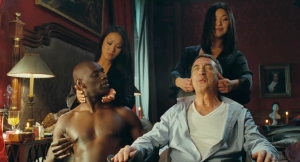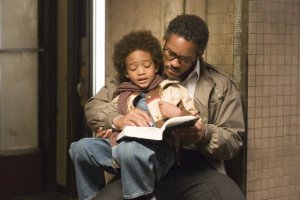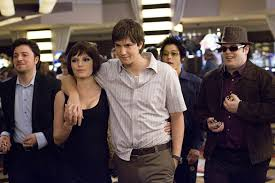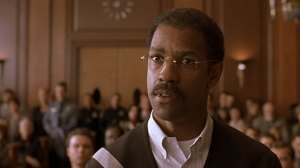So many movies are prefaced with those five sneaky little words: “based on a true story.” But what exactly do they mean? The answer is: nothing. Unless it’s a documentary, in which case you’re still not getting a complete truth, but at least you’re getting close. But in film we play pretty fast and loose with those words, and it’s up to the audience to decide how much weight we give them.
I got to thinking on the subject this week when I watched Intouchables, which is “based on a true story.” You may remember it’s about a tough young black guy who works for a paralyzed older rich one, as they touch and inspire each other’s lives for the better. In real life, the young  employee was actually an Algerian named Abdel. Does this change the heart of the story? Maybe not. But it does make me question the screen writer’s motives: did they just love this particular actor, who happened to be black, or did they feel it would resonnate better with us that he was African rather than Algerian, or did they think they’d get more mileage out of a bigger racial disparity? It doesn’t matter, I suppose, if you’re just there for a good story and some entertainment. But why then are directors still insisting those little words preface their fudged facts? We rarely have any of this information at our fingertips when we sit down with popcorn in our laps at the theatre. No one’s telling us what’s true and what’s just a cinematic embellishment.
employee was actually an Algerian named Abdel. Does this change the heart of the story? Maybe not. But it does make me question the screen writer’s motives: did they just love this particular actor, who happened to be black, or did they feel it would resonnate better with us that he was African rather than Algerian, or did they think they’d get more mileage out of a bigger racial disparity? It doesn’t matter, I suppose, if you’re just there for a good story and some entertainment. But why then are directors still insisting those little words preface their fudged facts? We rarely have any of this information at our fingertips when we sit down with popcorn in our laps at the theatre. No one’s telling us what’s true and what’s just a cinematic embellishment.
Think back to that Will Smith vehicle The Pursuit of Happyness, based on the true story of Chris Gardner, who in the movie solves a rubik’s cube to get a shot at being a stock broker, and spends the trainer caring for his son in various subway bathrooms and homeless shelters so they can turn their lives around. In actuality, there was no rubik’s cube. Shocking, I know. Also, there was no kid. I mean, he had a kid, he conceived him while cheating on his first wife. But he dumped the kid with the mother and didn’t know where either of them were during his training. So, you know, not exactly the father of the year material that the movie pushes down your throat. Oh, and you know that big arrest (for unpaid parking tickets) that almost derailed his interview? Yeah, that was actually on a charge of domestic violence. That rosy little detail was left the fuck out.
they can turn their lives around. In actuality, there was no rubik’s cube. Shocking, I know. Also, there was no kid. I mean, he had a kid, he conceived him while cheating on his first wife. But he dumped the kid with the mother and didn’t know where either of them were during his training. So, you know, not exactly the father of the year material that the movie pushes down your throat. Oh, and you know that big arrest (for unpaid parking tickets) that almost derailed his interview? Yeah, that was actually on a charge of domestic violence. That rosy little detail was left the fuck out.
 In the movie 21, a professor recruits star students, teaches them how to count cards, and takes them to Las Vegas to win lotsa money. Did this really happen? Apparently so. Only the MIT Blackjack team was almost entirely Asian. The movie? Completely whitewashed. Does Kevin Spacey look like a cross-dressing Asian to you? I mean, he’s phoning in his performance, but no, he doesn’t. There are a couple of throwaway Asians somewhere in the pack, but you’ll have to squint pretty hard past all the handsome white dudes to find them.
In the movie 21, a professor recruits star students, teaches them how to count cards, and takes them to Las Vegas to win lotsa money. Did this really happen? Apparently so. Only the MIT Blackjack team was almost entirely Asian. The movie? Completely whitewashed. Does Kevin Spacey look like a cross-dressing Asian to you? I mean, he’s phoning in his performance, but no, he doesn’t. There are a couple of throwaway Asians somewhere in the pack, but you’ll have to squint pretty hard past all the handsome white dudes to find them.
To make up for this sad racial bias, Hollywood presents to you: the “true” story of Rubin Hurrican Carter, an about-to-make-it-big boxer who is wrongly accused and convicted of a triple homicide thanks to an oppressive white system and spends 22 years in jail before some random Canadians turn up a piece of evidence that finally vindicates him. Great story, none of it true. First, the big match where Hurricane beats his (white) opponent soundly only the mean (white) judges give the win to the other guy? Yeah, didn’t happen. Well, I mean, it’s a historical fact: the fight did happen. But that other guy won fair and square – and by quite a long mile. A mile so long and so definitive that he sued the producers of the movie and won. Oh, and the part about him being wrongly convicted? Well, I hate to break it to you, but…I cannot attest to his guilt or innocence. All I can say is that he did have a colourful criminal past. Heavy on assault and battery. He was court-marshalled four times before being booted out of the army. He failed his lie detector test with flying colours and was convicted not once of these murders, but twice. The first verdict was overturned on a technicality. During his second trial a bunch of witnesses were now confessing that they’d lied for him about his alibi. He’s convicted again – but what about that vindicating piece of evidence? No such thing. Again, technicality. But it had been so long that no one was interested enough to put up a third trial, and so they all went home. But that doesn’t make for a rousing movie, now does it?
judges give the win to the other guy? Yeah, didn’t happen. Well, I mean, it’s a historical fact: the fight did happen. But that other guy won fair and square – and by quite a long mile. A mile so long and so definitive that he sued the producers of the movie and won. Oh, and the part about him being wrongly convicted? Well, I hate to break it to you, but…I cannot attest to his guilt or innocence. All I can say is that he did have a colourful criminal past. Heavy on assault and battery. He was court-marshalled four times before being booted out of the army. He failed his lie detector test with flying colours and was convicted not once of these murders, but twice. The first verdict was overturned on a technicality. During his second trial a bunch of witnesses were now confessing that they’d lied for him about his alibi. He’s convicted again – but what about that vindicating piece of evidence? No such thing. Again, technicality. But it had been so long that no one was interested enough to put up a third trial, and so they all went home. But that doesn’t make for a rousing movie, now does it?
Fargo is one of my favourite movies, opens with a card that tells us that this too is based on a  true story. Exact words: The events depicted in this film took place in Minnesota in 1987. At the request of the survivors, the names have been changed. Out of respect for the dead, the rest has been told exactly as it occurred. But the true truth is that it’s a bunch of baloney. Yeah, there have been crimes in the world, sometimes even husbands killing wives. For money. But this story, friends, is a work of fiction. At the end of the Coen brothers’ screenplay, there is a note: “[the film] aims to be both homey and exotic, and pretends to be true.” The “true story” moniker has become a stylistic device.
true story. Exact words: The events depicted in this film took place in Minnesota in 1987. At the request of the survivors, the names have been changed. Out of respect for the dead, the rest has been told exactly as it occurred. But the true truth is that it’s a bunch of baloney. Yeah, there have been crimes in the world, sometimes even husbands killing wives. For money. But this story, friends, is a work of fiction. At the end of the Coen brothers’ screenplay, there is a note: “[the film] aims to be both homey and exotic, and pretends to be true.” The “true story” moniker has become a stylistic device.

Great piece. I like to check “History Vs Hollywood” whenever I see “Based On A True Story”, not so much in terms of the likeness of a character, but to see how much artistic licence was taken.
Foxcatcher was a prime example where the true story was actually more interesting than the film, and instead they focussed on the wrong character and miss-told the story. There’s plenty of other examples, you’ve touched on quite a few. We could be here all day discussing them…
LikeLike
Artistic license is a great license, isn’t it?
LikeLiked by 1 person
Great job, Jay! The “based on a true story” disclaimer is way overused and it’s scary how far from the truth some of these movies actually stray, because people will tend to take them at face value. When really, they are no better than sponsored content and maybe worse because the bias(es) is/are hidden behind the “true story” shield. Hurricane is a great example of how far from the truth we can end up, and how much a movie can obscure what really happened.
LikeLike
fascinating. one of my favorite movies, Wild Hearts Can’t Be Broken, claims to be based on a true story, but I know that the person it was based on wasn’t happy with the depiction and distanced herself from the production, which always made me wonder how much was actually true.
LikeLike
The guy who was supposedly the basis for the guy in Hurt Locker brought a lawsuit against the film makers I recall, because it damaged his career or similar, but maybe that was a publicity stunt? Anyhow seems to me if you’re going to do a ‘based on’ at least get the real people onside.
LikeLike
Yeah, it’s kind of suspicious if the real people back away from it.
LikeLiked by 2 people
Haha, just a little bit suss!
LikeLike
This has been going on since there have been movies, unfortunately. And it’s not going to stop. I’m only surprised you didn’t mention such horror flicks that use the device, such as The Amityville Horror, The Haunting in Connecticut, or of course, The Exorcist. I prefer the slightly less declarative “Inspired by true events.” At least that way, the filmmakers are owning up (sorta) to the fact that they made it up.
LikeLike
Horrors are the worst abusers but also the most easy to bust. Also, I don’t watch em.
LikeLike
Ah yes, the old “Based on a True Story” line. If anything has to be taken with a grain of salt (or a kernel of popcorn…), it’s that one. I hadn’t known most of what you shared above. Interesting to learn. Sure moves those movies more solidly into the fiction file.
LikeLike
How about the part with the foot sticking out of the wood chipper?
Even memoir is fiction. Even words, come to think of it. Metaphors for the real thing.
Still, will forever more take the words “based on a true story” with a grain of salt. Thanks? Cheers —
LikeLiked by 1 person
Very eenteresting. Yep the movie makers never revealed any of the facts you’ve disclosed here. I just accept pretty much all movies as fiction. It’s not exactly the same, but I hate it when movie makers stray from the book as well.
LikeLike
Great post! A very interesting read, and so true…. simply a stylistic device and nothing more.
Though, for an interesting take on this issue, and more specifically on the trick Fargo pulled, I must recommend this to you: http://wp.me/p4P9IW-B
It is quite the movie!
LikeLike
I tend to hate a lot of movies that are based on true stories or real people. I find them lazily written, usually hoping that we’ll be more emotionally invested knowing that it’s “true”. The characters rarely talk or act like real people and the events themselves seem phony. Give me fiction over pseudo-fact any day.
LikeLike
About Fargo, the Coens said that they always wanted to do a true story but they didn’t really know any so they decided to make one up.
LikeLike
It may not be true but I’ve read that people have gone looking for the case full of money buried in the snow in Fargo. That cracks me up. If anyone did believe the film was faithful to real events the only way the Coen brothers could have known what Carl Showalter did with the money is if it had been recovered, possibly even before the snow melted.
I also love it that O Brother Where Art Thou owes more to Sullivan’s Travels than The Odyssey, which fits with how films have mythologized events.
LikeLike
Great post. I wish more would use “inspired” by a true story, because that to me spells out that they’re changing things/making shit up. I usually try to research movies that have that disclaimer before I watch them, I didn’t do that with The Butler, and when I found out what was made up and what was real, it completely ruined the movie for me.
LikeLike
Clever analysis, and thanks so much for the background information of each movies. I have to be more critical on this type of movies in the future, most of the time I did not do background check 😦
LikeLike
Jay, a well done bit of truth on your part. Tubularsock doesn’t believe the bull shit that runs as real in the illusion that we live in so to believe the fictionalized celluloid version of the lie has never been an issue for Tubularsock. Even the documentary is just a distorted look at an issue from a frame. Life is 360 degrees all the time in a constantly moving venue. We can’t even capture it while we’re in it so to even consider a movie being “based on a true story” is rather a silly concept. Your exposing it as so is refreshing to read and Tubularsock enjoys your work. Thank you.
LikeLike
Pingback: June 2015 Favourites | FILM GRIMOIRE
Great stuff. Reading this I’m not sure what the point of that Will Smith film was…?
LikeLike
I always think the real tell-take sign is when a movie claims to be “inspired by true events” which means that something quite similar may have happened at some point.
You’ve really shocked me with the Happyness facts though.
LikeLike
Ha, yes “inspired” is a slippery little word!
LikeLike
Pingback: War Dogs | ASSHOLES WATCHING MOVIES
Pingback: Masterminds | ASSHOLES WATCHING MOVIES